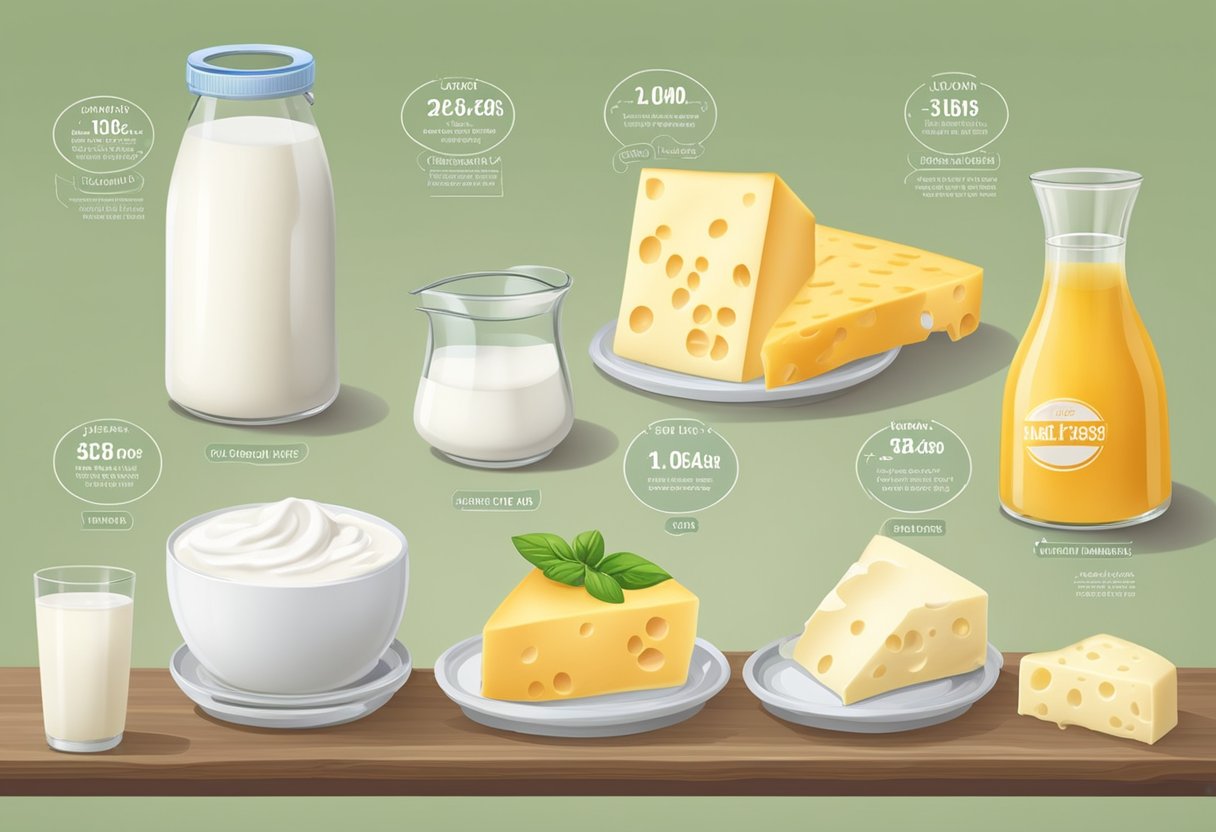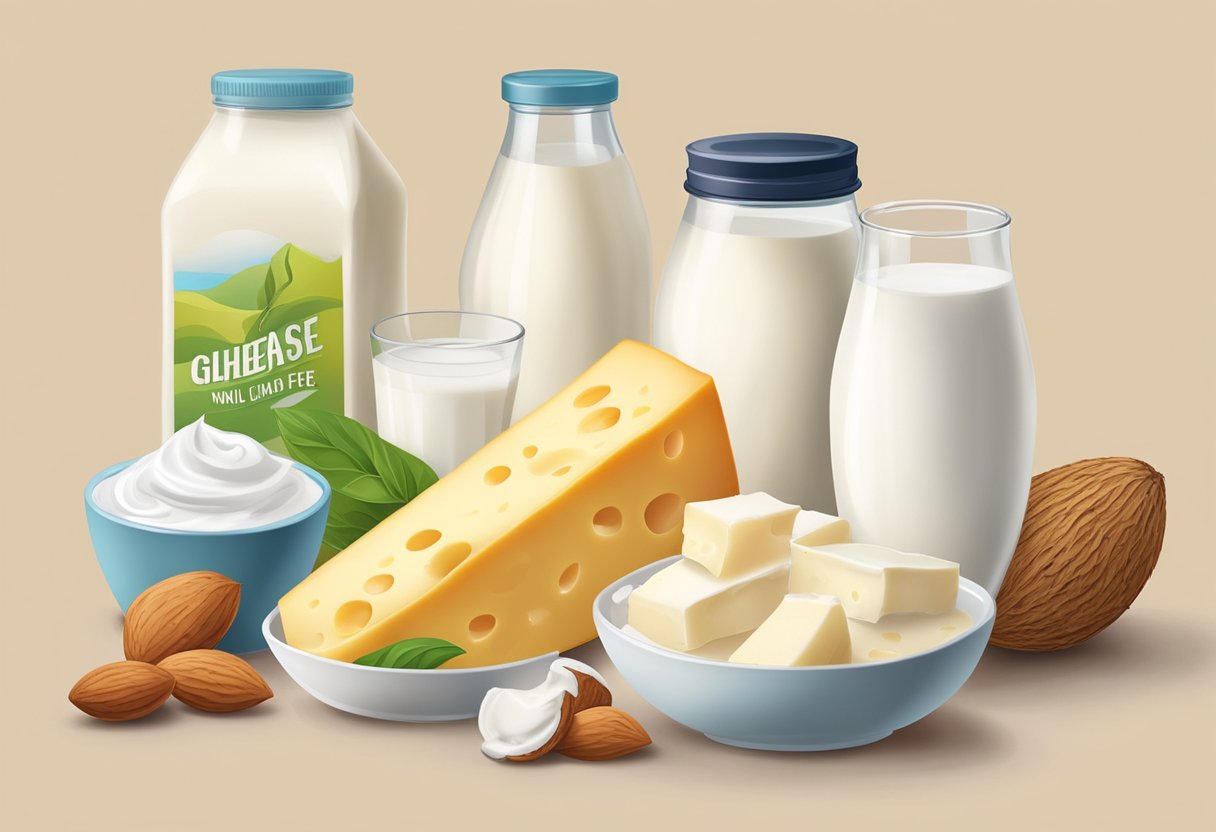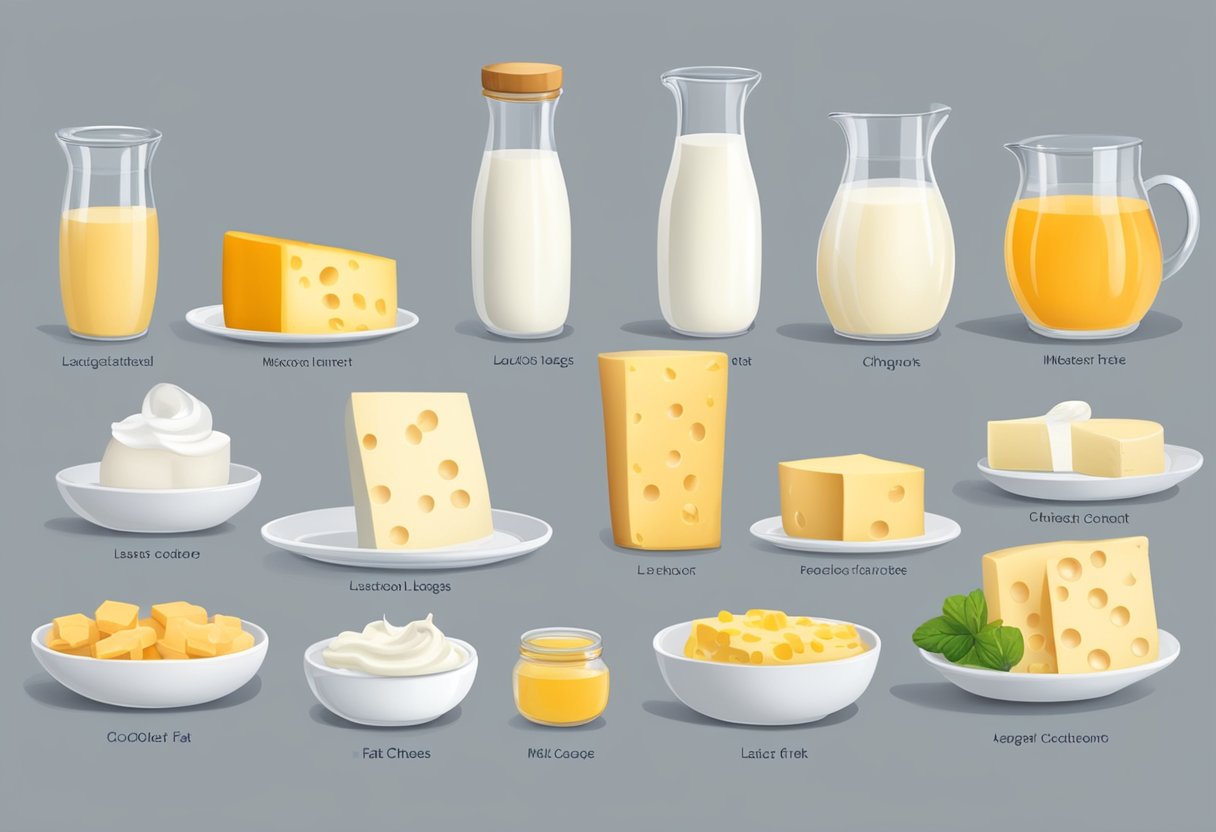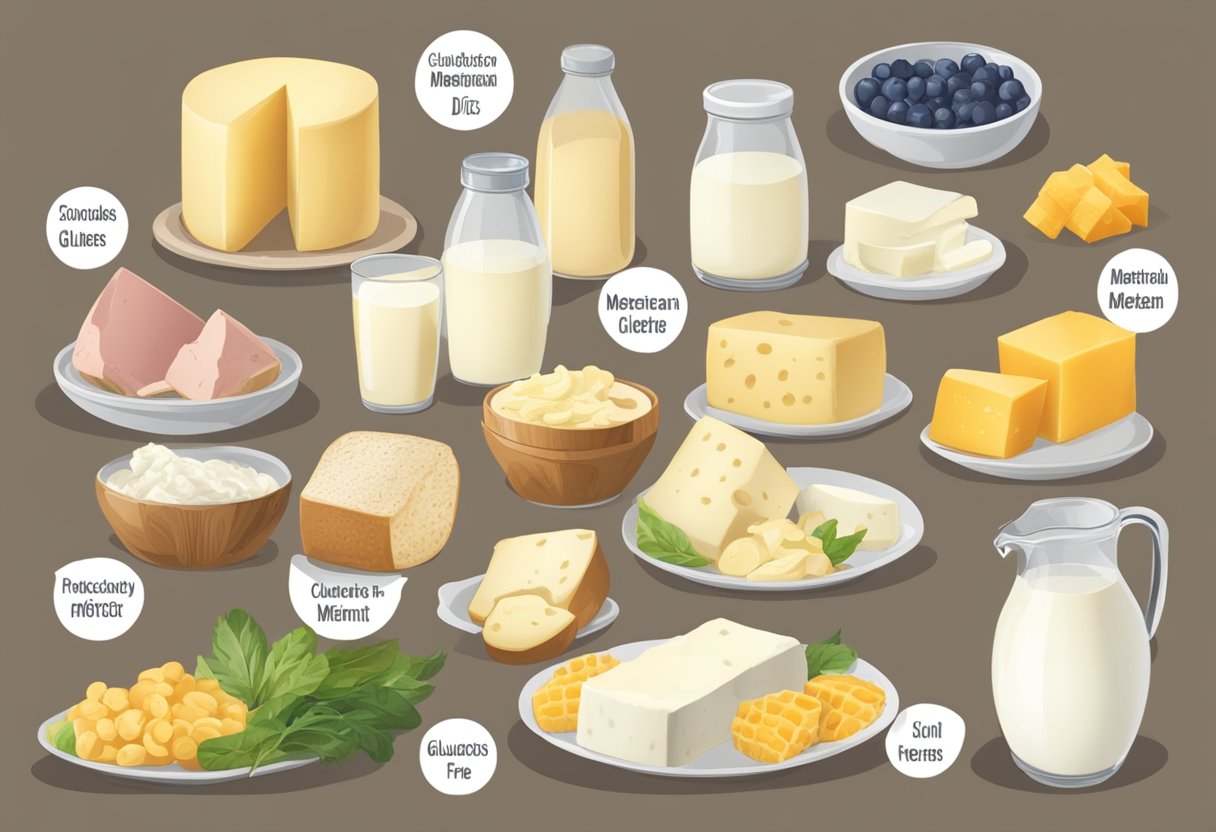The gluten-free Mediterranean diet adapts traditional Mediterranean eating practices, known for their health benefits, to suit those with celiac disease or gluten sensitivity. In addition to eliminating gluten, individuals may need to consider the lactose content and fat levels in dairy products. Dairy can be a part of the gluten-free Mediterranean diet in moderation; however, choosing lactose-free options or dairy with lower fat content can be beneficial, especially for those with lactose intolerance or seeking to manage their fat intake for health reasons.

While the diet encourages the consumption of vegetables, fruits, whole grains, legumes, and healthy fats, it suggests moderation in dairy and high-fat products. Given the high prevalence of lactose intolerance and the potential health concerns related to saturated fats in dairy, it’s essential to understand how to make dairy choices that align with both the gluten-free Mediterranean diet and one’s personal nutritional needs.
Key Takeaways
- The gluten-free Mediterranean diet is tailored for those avoiding gluten while promoting overall health and nutrition.
- Lactose intolerance necessitates careful selection of dairy products within this diet.
- Opting for lactose-free and low-fat dairy options can align with dietary goals and personal health needs.
Table of Contents
Understanding Gluten-Free Mediterranean Diet

The Gluten-Free Mediterranean Diet merges the healthful eating principles of the traditional Mediterranean lifestyle with the essential dietary adjustments for those with gluten sensitivities. This comprehensive approach to nutrition emphasizes whole foods and a balanced intake of macronutrients.
What Is Gluten?
Gluten is a protein composite found in grains such as wheat, barley, and rye. It is responsible for the elasticity and chewable texture in breads and other baked goods. For individuals with celiac disease or gluten sensitivity, consuming gluten can lead to various health issues, hence the necessity for a gluten-free diet.
Basics of the Mediterranean Diet
The Mediterranean Diet focuses on the consumption of a variety of foundational foods: whole grains, fruits, vegetables, nuts, seeds, and legumes, with olive oil as a primary source of fat. This diet is known for its nutritional balance and is guided by dietary guidelines that recommend moderate amounts of dairy and seafood, low consumption of meat, and a high intake of plant-based foods.
Combining Gluten-Free and Mediterranean Diets
A Gluten-Free Mediterranean Diet requires avoidance of gluten while still adhering to the core components of the Mediterranean Diet. This includes:
- Whole Grains: Opting for gluten-free options such as quinoa, rice, and gluten-free oats.
- Healthy Fats: Utilizing olive oil as a staple fat source.
- Plant-Based Foods: Emphasizing a high intake of fruits, vegetables, nuts, seeds, and legumes.
By integrating these components, individuals can enjoy the health benefits of the Mediterranean diet while maintaining a strict gluten-free regimen.
Health Benefits
Integrating dairy carefully within the confines of a gluten-free Mediterranean diet can lead to significant health benefits. Emphasizing low-lactose and low-fat dairy options, individuals often experience improvements in cardiovascular health, weight management, and gut health, while also potentially reducing the risk of diabetes and metabolic syndrome.
Cardiovascular Health
A gluten-free Mediterranean diet that includes select dairy products may reduce cardiovascular risk. The inclusion of dairy like plain Greek yogurt can contribute to lower blood pressure and reduced risk of heart disease.
Weight Management
The balance of high-quality proteins and beneficial fats in certain dairy products assists in weight management. By choosing low-fat options, individuals aiming to avoid becoming overweight or combat obesity may find these foods supportive in achieving their weight goals.
Gut Health and Inflammation
The live cultures found in some dairy products, such as yogurt, can enhance the gut microbiota, favoring a robust digestive system. This can lead to a decrease in chronic inflammation associated with various health issues.
Diabetes and Metabolic Syndrome
Limited consumption of high-fat and high-lactose dairy products within a gluten-free Mediterranean diet contributes to nutrition that supports the regulation of blood sugar levels, reducing the risk of diabetes and metabolic syndrome. Lean dairy products provide essential nutrients without the added risk of exacerbating inflammation.
Lactose in Dairy Products
Navigating dairy on a gluten-free Mediterranean diet requires understanding lactose, especially for individuals dealing with lactose intolerance. Dairy products contain varying amounts of this natural sugar, which can affect those with digestive sensitivities.
Effect on Lactose Intolerance
Lactose intolerance arises when an individual’s body produces insufficient amounts of lactase, the enzyme needed to digest lactose found in dairy products. Symptoms can include bloating, gas, and abdominal discomfort. Notably, the degree of intolerance can vary, with some people able to consume certain dairy products like aged cheese and specific yogurts in moderation.
- High-Lactose Dairy: Milk-based products such as milk, ice cream, and some cheeses.
- Low-Lactose Options: Aged cheeses (e.g., cheddar) and specialized products labeled ‘lactose-free’.
Individuals adhering to a gluten-free Mediterranean diet can also opt for lactose-free alternatives or emphasize non-dairy calcium sources like leafy greens and fish with bones.
Sources of Lactose in Dairy
The primary sources of lactose in the diet are milk products. The amount of lactose varies significantly:
- Milk: Ranges from whole to skim, with lactose content consistent across fat levels.
- Yogurt: Contains lactose but also live cultures that can aid in its digestion.
- Cheese: Harder, aged cheeses typically have less lactose, while softer, processed cheeses may have more.
For a gluten-free Mediterranean diet, focus on incorporating lactose-light dairy options when possible and be mindful of the hidden lactose that can appear in processed foods not typically associated with dairy.
High-Fat Dairy and Health Concerns

When considering a gluten-free Mediterranean diet, it’s essential to understand how high-fat dairy products, particularly those high in saturated fats, can impact health.
Saturated vs. Unsaturated Fats
Dairy products often contain a mix of saturated and unsaturated fats. Saturated fatty acids are solid at room temperature and can contribute to an increase in LDL (bad) cholesterol levels when consumed in excess. In contrast, polyunsaturated fatty acids are liquid at room temperature and may benefit heart health. High-fat dairy products usually have a higher ratio of saturated fat, prompting caution in consumption.
Impact on Cardiovascular Health
The relationship between high-fat dairy consumption and cardiovascular health is complex. Studies have shown that while some high-fat dairy products like cheese and yogurt can be part of a heart-friendly diet, excess consumption of dairy fat can be associated with a higher risk of cardiovascular disease. Replacing dairy fat with healthier fats or whole grains might lower cardiovascular disease risk.
Role in Inflammation
Dairy can play a contradictory role in inflammation; some components in dairy might provoke inflammation, especially in individuals sensitive to lactose. Conversely, fermented dairy products like yogurt have been linked to anti-inflammatory effects. The impact of high-fat dairy on inflammation is not fully understood and may vary from person to person.
Dietary Recommendations
For individuals following a gluten-free Mediterranean diet, the American Heart Association suggests limiting intake of high-fat dairy products and favoring fat-free or low-fat options. This aligns with the Mediterranean diet’s focus on reducing saturated fat intake and prioritizing healthy fats, like those found in olive oil, nuts, and fatty fish.
Nutrient Considerations in the Gluten-Free Mediterranean Diet

Adopting a gluten-free Mediterranean diet requires careful attention to ensuring nutritional adequacy, especially when limiting dairy products. Individuals must focus on getting sufficient protein, fiber, and essential vitamins and minerals while managing calorie intake.
Ensuring Adequate Protein Intake
Protein is vital for maintaining muscle mass and overall health. On a gluten-free Mediterranean diet, one must consider alternative protein sources due to restrictions on certain dairy products. Legumes, nuts, seafood, and poultry become even more crucial as they provide high-quality protein without lactose concerns.
Importance of Fiber and Whole Grains
A key component of the Mediterranean diet is the high intake of [dietary fiber] and whole grains. However, traditional whole grains often contain gluten. Therefore, individuals must find gluten-free grains such as quinoa, brown rice, and gluten-free oats, which contribute to fiber intake, aiding digestion and cardiovascular health.
Vitamins and Minerals
The limitation of certain dairy products could lead to deficiencies in essential vitamins and minerals like calcium and vitamin D. Individuals should include gluten-free dairy alternatives fortified with these nutrients, alongside other foods rich in iron, folate, vitamin B12, and fat-soluble vitamins to maintain nutritional balance.
Balancing Macronutrients and Calories
Consuming the right balance of macronutrients is crucial for maintaining energy levels and a healthy weight. Those on a gluten-free Mediterranean diet should track their intake of carbohydrates, protein, and fats, ensuring that they come from high-quality sources, such as fruits, vegetables, lean proteins, and healthy fats like olive oil. Calorie intake should be monitored to ensure it aligns with individual health goals and activity levels.
Recommended Foods and Alternatives

In a gluten-free Mediterranean diet, it’s essential to find nutrient-dense substitutes for both lactose and high-fat dairy products. These alternatives should align with the heart-healthy focus of the diet, emphasizing whole foods with gluten-free grains, dairy-free options, and plenty of fruits and vegetables.
Dairy Alternatives
For those looking to limit lactose and high-fat dairy intake, numerous dairy-free options are enriched with calcium and other essential nutrients. Almond, soy, and coconut milks are popular choices, as are dairy-free yogurts made from these same bases. When selecting dairy alternatives, one should opt for unsweetened varieties to avoid added sugars.
Gluten-Free Grains
Gluten-free grains serve as the foundation for many Mediterranean dishes. Quinoa and buckwheat, both pseudocereals, are excellent options that provide protein and polyphenols. Additionally, rice, particularly whole-grain or wild rice, and gluten-free oatmeal can be integrated into meals to maintain variety and nutritional balance.
Vegetables, Fruits, and Legumes
A colorful array of vegetables and fruits provides essential vitamins, minerals, and bioactive compounds. Leafy greens, tomatoes, cucumbers, and bell peppers are staples. Legumes such as lentils, chickpeas, and beans are not only gluten-free but also rich in protein and fiber, making them excellent meat alternatives.
- Vegetables: Spinach, Kale, Zucchini
- Fruits: Berries, Apples, Oranges
- Legumes: Black Beans, Lentils, Chickpeas
Nuts, Seeds, and Healthy Fats
Including a variety of nuts and seeds in the diet introduces additional healthy fats and nutrients. Almonds, walnuts, and chia seeds offer omega-3 fatty acids and can be easily incorporated into snacks or meals. As for fats, extra virgin olive oil is a hallmark of the Mediterranean diet and should be used in cooking and dressings for its heart-healthy properties.
Special Considerations

When adopting a gluten-free Mediterranean diet, it is crucial to consider the unique nutritional needs of specific demographics, especially when limiting dairy products. Certain groups, such as children, women, and the elderly, require careful attention to maintain nutritional balance and health.
Children and Adolescents
Children and adolescents on a gluten-free Mediterranean diet need adequate calcium and vitamin D for bone development. Since they are reducing lactose intake, they should incorporate calcium-fortified, lactose-free options such as almond milk or rice milk. It is essential for their growth that they receive a variety of nutrient-dense foods to ensure a nutritionally adequate diet.
Women’s Health
For women, particularly those who are pregnant or at risk of osteoporosis, the Mediterranean diet has notable benefits but must be balanced with sufficient dairy alternatives. Lactose-free dairy products offer a solution to those who are lactose intolerant. Foods like leafy greens, nuts, and sesame seeds can provide the needed calcium and nutrients when high-fat dairy products are limited.
Aging Population
The aging population requires a focus on nutrient-rich foods that provide essential vitamins and minerals without aggravating lactose sensitivity. A gluten-free Mediterranean diet that includes lower lactose options, such as hard cheeses and Greek yogurt, can help maintain strong bones and muscles while addressing digestive comfort.
Managing Dietary Restrictions

Incorporating a gluten-free Mediterranean diet while limiting certain dairy products requires careful attention to food choices. Effective management hinges on the meticulous reading of food labels, navigating dining out, and ensuring consistent adherence to dietary guidelines.
Label Reading and Food Selection
When selecting food products, individuals should closely examine labels to identify gluten and lactose content. Gluten-free labeling is crucial for those with celiac or coeliac disease to avoid gluten-containing grains like wheat, barley, and rye. Similarly, for individuals limiting lactose or high-fat dairy intake, labels indicating “lactose-free” or “low-fat” can guide choices. Look for product certifications from reputable organizations to ensure safety and compliance.
Eating Out and Social Situations
Navigating social eating scenarios demands clear communication and vigilance. Individuals should inform restaurant staff of their dietary restrictions, emphasizing the need to avoid cross-contamination with gluten and lactose. Seeking out restaurants that have specific gluten-free menus or are known for Mediterranean cuisine can facilitate the process, as these establishments are more likely to provide suitable options.
Adherence to Dietary Compliance
Cohesion to a gluten-free and selective dairy Mediterranean diet is central for maintaining health, particularly for those with celiac disease. Developing a routine that incorporates a variety of gluten-free grains, fruits, vegetables, and lean proteins, while also moderating intake of lactose and high-fat dairy, is ideal. Consistent compliance not only supports physical well-being but also reduces the potential risks associated with inadvertent consumption of restricted foods.
Frequently Asked Questions

In navigating a gluten-free Mediterranean diet, individuals sensitive to lactose and high-fat dairy products often have specific concerns. Below are detailed answers to common questions about dairy consumption within this dietary framework.
What types of dairy should I limit if I’m sensitive to lactose and following a Mediterranean diet?
Individuals should limit high-lactose dairy products such as regular milk, soft cheeses, and cream. Lactose can exacerbate digestive discomfort for those with lactose intolerance, even on a Mediterranean diet.
Which low-fat dairy products are recommended for an anti-inflammatory Mediterranean diet?
Yogurt and kefir, particularly those that are low-fat, can be beneficial for an anti-inflammatory Mediterranean diet. They offer probiotics that support gut health without the high fat content that can trigger inflammation.
Are there lactose-free milk options that are less likely to cause inflammation?
Lactose-free milk options such as lactose-free cow’s milk or fortified plant-based drinks like almond or soy milk can be less inflammatory due to the absence of lactose and often contain essential nutrients such as calcium and vitamin D.
How does cheese consumption affect inflammation in the context of a Mediterranean diet?
Consuming moderate amounts of cheese, especially aged varieties that are naturally lower in lactose, can be part of a Mediterranean diet. It’s advisable to choose cheeses that are high in quality and low in saturated fats to minimize inflammation.
What non-dairy alternatives align with the principles of an anti-inflammatory and gluten-free Mediterranean diet?
Non-dairy alternatives like almond milk, coconut yogurt, and cashew cheese align with an anti-inflammatory and gluten-free Mediterranean diet. These products are naturally lactose-free and offer various nutrients beneficial for overall health.
Can adhering to a gluten-free Mediterranean diet help reduce joint inflammation, and what dairy products are implicated?
A gluten-free Mediterranean diet can help in reducing joint inflammation. Dairy products implicated in increased inflammation, such as whole milk and butter, should be consumed in limited quantities or avoided in favor of plant-based alternatives.



